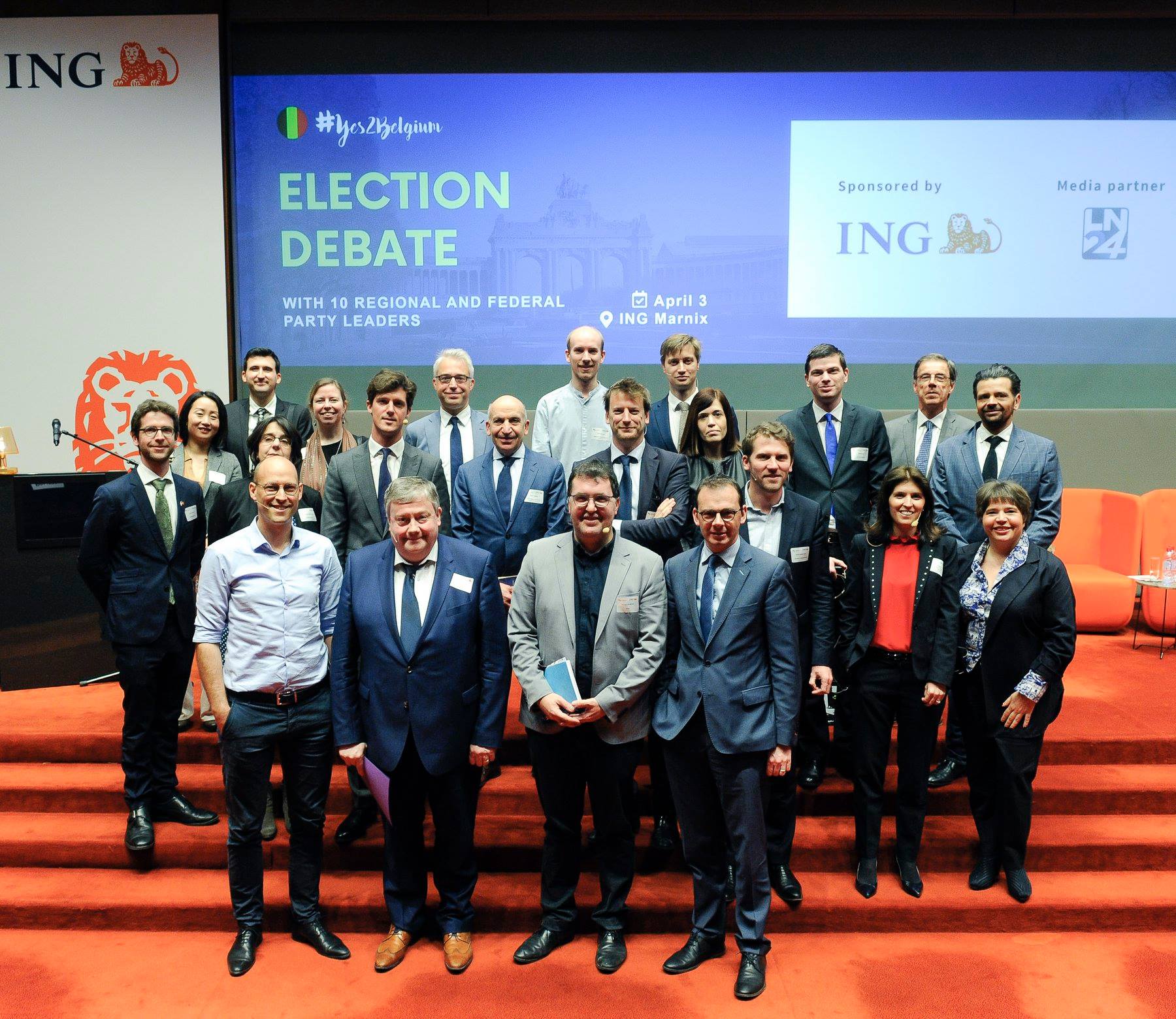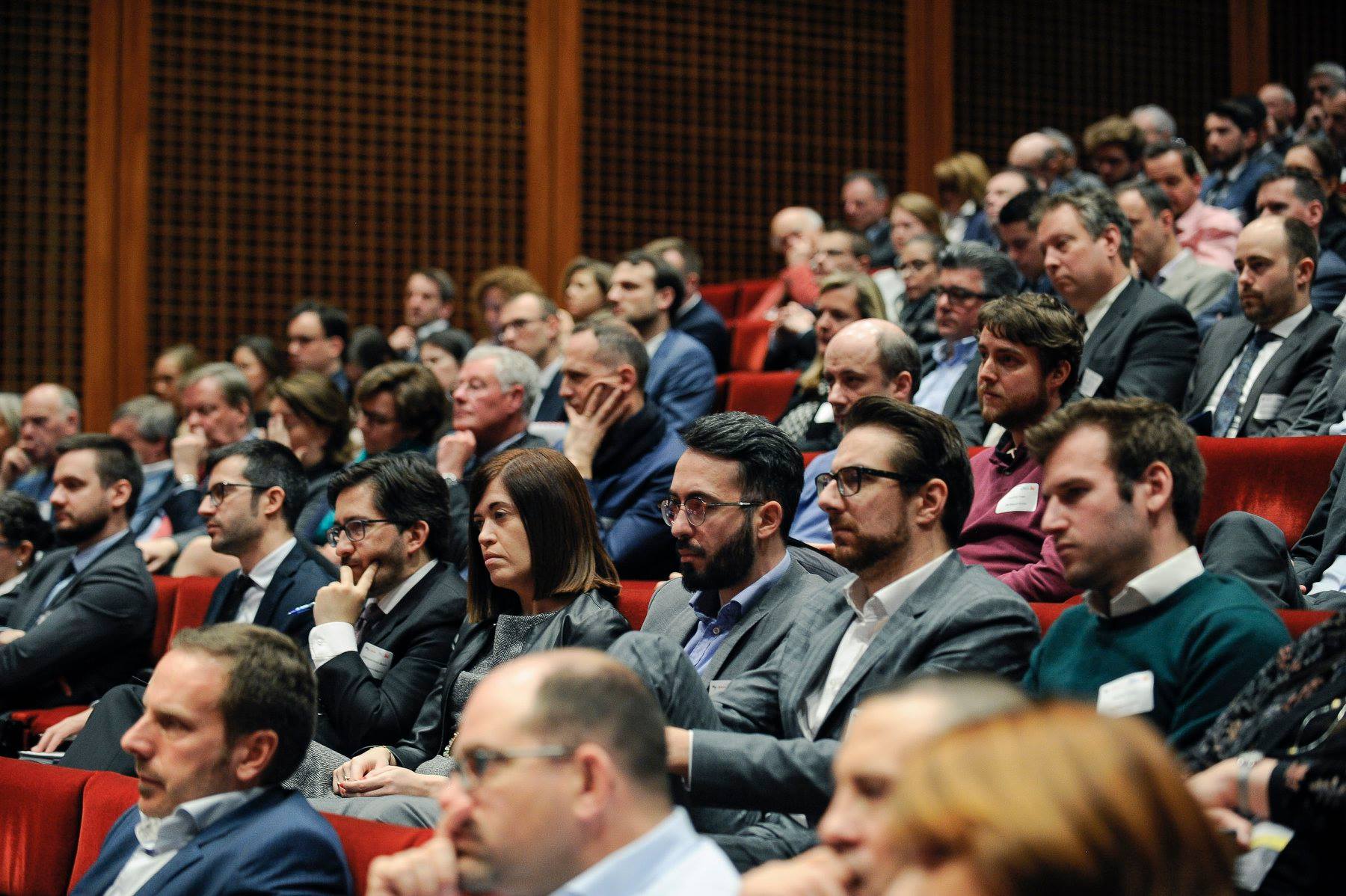- Daily & Weekly newsletters
- Buy & download The Bulletin
- Comment on our articles
#yes2Belgium election debate: Regional and federal party leaders share their views with international business community
Ten Belgian politicians from the leading parties were invited to speak on four key issues: mobility, the labour market, corporation tax and employment costs and country governance. Moderators were Martin Buxant and Joan Condijts of LN24, a news channel due to launch on 2 September.
Introducing the debate, ING Belgium CEO Erik Van Den Eynden said: “We want Belgium to be attractive and to help people realise their dreams. One of Belgium’s assets is its work ethic, but we need a more flexible workforce. We are transforming and I want our entrepreneurial clients to transform more quickly.”
MOBILITY
Wouter Beke (CD&V) party president, member of federal parliament, Leopoldsburg mayor: “We have to invest in public transport, cycling and infrastructure, such as the transport hubs already created in Flanders ‘mobipoints’.”
Cécile Jodogne (DéFI) Brussels state secretary for foreign trade, minister French community government: “We need to evolve towards smarter mobility, using innovative solutions: multimodal routes which you book in advance, with a combination of private and public investment.”
Wouter Van Besien (Groen) Flemish parliament for Antwerp: “It’s not normal to have train delays and it's the same for goods. At Antwerp port there is an 18-month delay for booking containers on trains. The solution is investing in infrastructure and better managing public transport. It can be more efficient with digitalisation, better planning and a pricing on mileage.”
Alexia Bertrand (MR) Local councillor Woluwe-Saint-Pierre: “1-2% of the GDP (€4-8bn) is the cost of traffic congestion. We need co-operation from the four mobility ministers. Should we refederalise mobility or not? I think we need more charismatic leaders and to solve mobility we need special planning and a multimodal system.”
Jan Cornillie (sp.a) European parliament candidate : “No one is talking about congestion charges. The Flemish government is preparing a scheme for Flanders. We need to put a price on mobility at peak times, like in Stockholm.”
Antoine de Borman (cdH) director cdH research group CEPESS: "We need to facilitate alternatives for workers by investing in public transport. Quick fixes include the price of unique tickets in the whole of Brussels, which vary at the moment between €2.10 and €2.30. We need more car sharing and more security for cyclists."
Johan Van Overtveldt (N-VA) former Belgian finance minister: “There are three main issues: infrastructure, lack of investment and the three regions. There has been erosion of quality and quantity in infrastructure. Congestion pricing needs to be done carefully. And we need more flexible working.”
Gilles Vanden Burre (Ecolo) member federal parliament: “We want massive investment including the number of trains and lines, which would be a positive return for society.”
Marc Tarabella (PS) member of European Parliament: “Connectivity – the problem of internet in rural areas - needs investment so people can work from home.”

LABOUR MARKET
Wouter Beke (CD&V): “The issue for the next government is to get more people active in the market and we have to work with other regions. We can use skilled people in Wallonia and Brussels to work in Flanders rather than looking abroad.”
Cécile Jodogne (DéFI): “It’s important to never stop learning and to acquire new skills. Multilingualism is a speciality in Brussels and digitalisation is important for future jobs. The labour market must be more flexible with more teleworking and more co-working. But flexibility cannot lead to precariousness or affect the quality of work.”
Gilles Vanden Burre (Ecolo): “There should be training throughout professional careers. For sectors like IT it’s difficult to find talent. We need to focus on the digital revolution, particularly for people in the middle of their career.”
Franc Bogovic (Open VLD): “It’s the first time that we have around seven out of 10 people working, but we are still lagging behind the Netherlands and Germany. We should activate people by limiting and decreasing unemployment compensation.”
Jan Cornillie (sp.a): “What caused Brexit was massive migration, falling wages, worsening labour conditions. We need to be careful in improving flexibility. We need to invest in people so that they can enter the labour market.”
Antoine de Borman (cdH): “If you leave voluntarily the labour market you are punished. It starts in school, we need improvements there.”
Johan Van Overtveldt (NV-A): “We need to increase the incentive for people to join the labour market, such as unemployment benefits being limited over time.”
Wouter Van Besien (Groen): “It's a question of quality of work. Burnout is becoming the disease of the 21th century and is a challenge for society as a whole and the next legislature. We need strong measures for better quality of work and work/life balance. People need more support in the workplace.”
Alexia Bertrand (MR): “The latest Eurostat numbers show that unemployment is three times higher in Brussels for young, unskilled and non-EU workers. Need recruitment based on skills and not degrees. The job landscape is a jungle and needs synergy.”

CORPORATION TAX AND COST OF EMPLOYMENT
Antoine de Borman (cdH): “Fiscal labour costs have diminished, but we should be doing more for lowering labour costs on low-income workers. We need a EU strategy harmonising corporation tax for more stability.”
Gilles Vanden Burre (Ecolo): “We support the principle of decreasing corporation rate to 20-25% linked with simplification for SMEs and entrepreneurs.”
Johan Van Overtveldt (NV-A): “I’m surprised to hear Ecolo argue for a 20% rate. We should monitor EU countries. At 25% we are good. Lowering tax rate would make the country more competitive. Don’t forget we are in the monetary union and interest rates are decided by the ECB.”
Franc Bogovic (Open VLD): “We need to go further and reduce taxation. We are still one of the highest countries for tax in Europe.”
Marc Tarabella (PS): “The main fight is to tackle fiscal dumping. We also need to look at introducing property tax. The priority should also be diminishing red tape.”
Jan Cornillie (sp.a): “We need to look at EU savers and the need to guide people from excessive saving to useful investments.”
Wouter Beke (CD&V): “Reduce tax on labour and make more effort. It's good to have changed the corporation tax system but we need to give companies more fiscal stability. Plus invest in public transport and the energy sector and social security.”
Alexia Bertrand (MR): “Focus on low earners, cutting costs by 1% and increasing employment by 1%.”
Cécile Jodogne (DéFI): “We need private and public investment in R&D for innovation and a more collaborative economy.”

COUNTRY GOVERNANCE
Antoine de Borman (cdH): “It’s best to leave the institutions as they are and make the framework work. Strategic goals: energy, health and innovation.”
Wouter Van Besien (Groen): “Complexity is the price we pay. Two magic words: simpler and cooperation. We need fewer structures in Brussels and the regions and federal government to work together as there is competition between them.”
Alexia Bertrand (MR): “I agree that there are too many structures, but we need to be pragmatic, we don’t want another BHV (Bruxelles-Halles-Vilvoorde). We want to abolish the provinces.”
Johan Van Overtveldt (NV-A): “Analysis shows that we have performing healthcare, but we need to reduce inefficiency.”
Marc Tarabella (PS): “Politicians and the civil service are there to serve citizens and shouldn’t forget this and should answer them directly.”
Wouter Beke (CD&V): “We need to have one desk, which may be ambitious. Our problem is with the back office.”
Jan Cornillie (sp.a): “It’s disagreement that is the problem not complexity, for example, the recent decision on climate change. There is a lack of leadership.”
Franc Bogovic (Open VLD): “We all want an efficient government and should refederalise some services.”
Cécile Jodogne (DéFI): “Refederalisation is not a solution. Good governance is about simplification and transparency and good governance is also important for corporations.”
Gilles Vanden Burre (Ecolo): “Collaboration is a priority. Ecolo and Groen are one example, having one programme at federal level and one list in Brussels.”
Wouter Beke (CD&V): “Belgium is an open country with good living standards, economic prosperity and a location in the heart of Europe.”

















